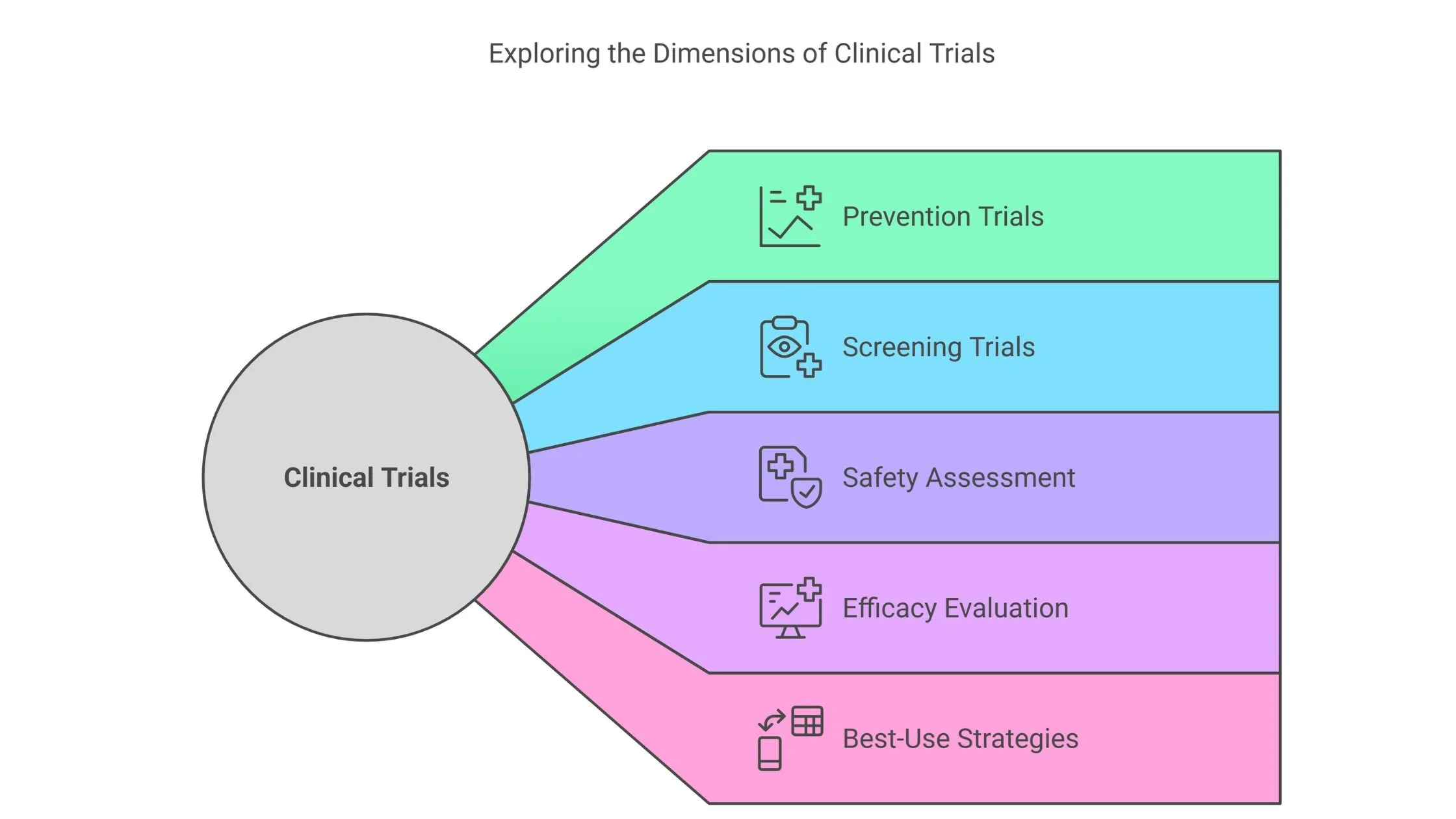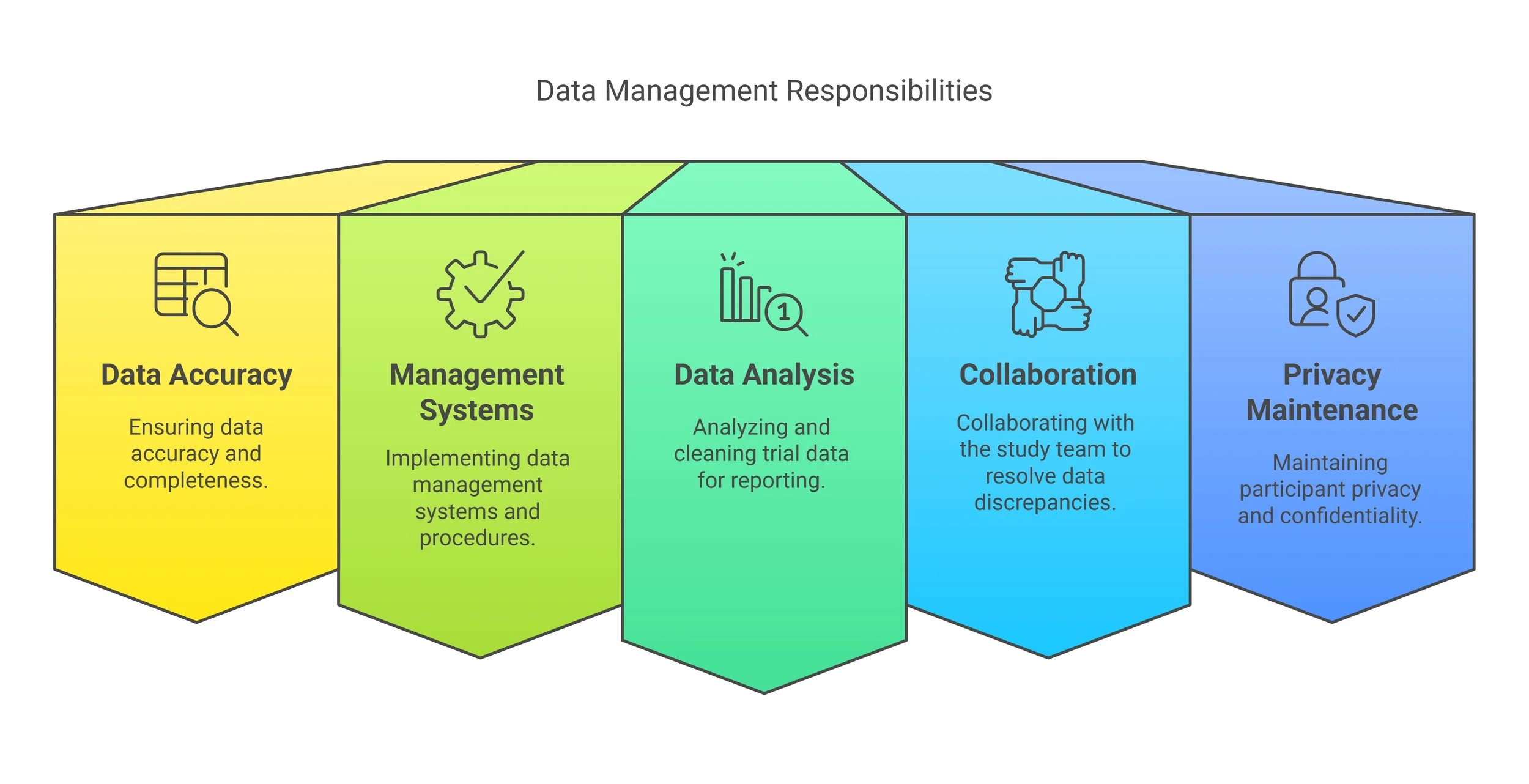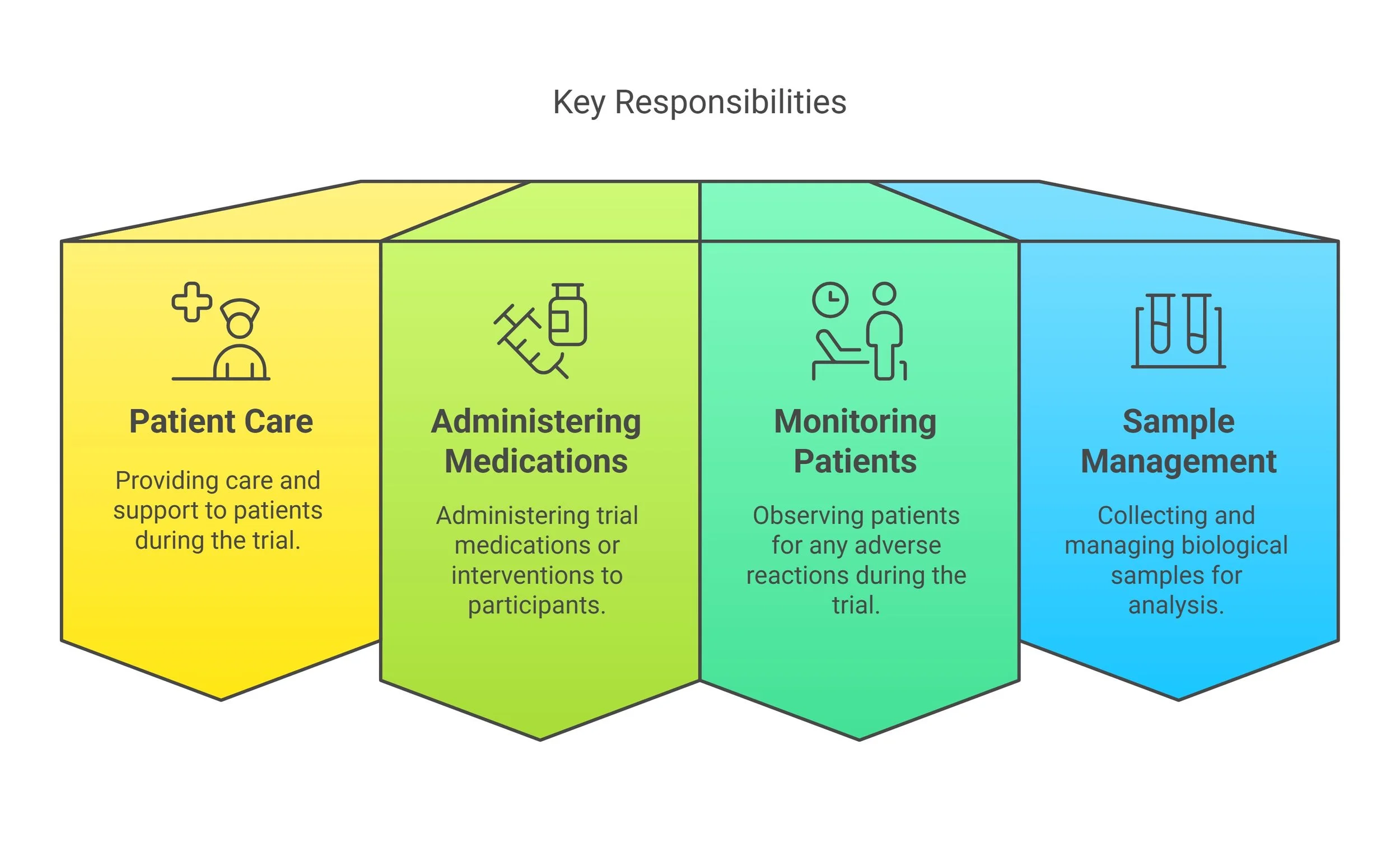The Clinical Trials Team - Roles & Responsibilities
In the rapidly evolving world of medical research clinical trials are a cornerstone of innovation. Whether it’s testing a new drug, developing advanced treatments, or exploring novel behavioral interventions, clinical trials provide the vital data that guides how we prevent, diagnose, and treat diseases. This comprehensive guide dives deep into the critical roles of the clinical trial team, their responsibilities, and how each member contributes to successful trial outcomes.
Clinical trials are fundamental in testing new treatments and improving existing ones. But what does it take to run a clinical trial? What roles are essential in making these trials successful? We’ll break down the clinical trial ecosystem and explore everything you need to know to understand the various responsibilities involved in clinical research.
What Is a Clinical Trial and Why Are They So Important?
A clinical trial is a research study conducted on individuals to evaluate a medical, surgical, or behavioral intervention. It is an essential part of medical research, allowing researchers to assess the effectiveness of new treatments and methods in preventing, diagnosing, and treating diseases. The trials follow a carefully structured process, usually overseen by a team of professionals, with each playing a vital role in ensuring the research runs smoothly.
Clinical Research Careers:
Clinical Research Associate (CRA)
Clinical Research Coordinator (CRC)
Drug Safety Monitor (PV)
Clinical Trial Assistant (CTA)
Clinical Research Nurse (CRN)
Medical Monitor (MM)
All Research Professionals (ICH GCP)
The Purpose of Clinical Trials
The main goal of clinical trials is to gather data that can lead to the approval of new treatments or improve existing ones. These trials help determine the safety, efficacy, and best-use strategies for new drugs, therapies, and interventions.
There are different types of clinical trials, ranging from prevention trials aimed at reducing disease risk to screening trials designed to identify diseases earlier. Each trial is meticulously designed to answer specific questions about a particular treatment or approach.
Key Roles in a Clinical Trial: A Breakdown
Every clinical trial requires a team of professionals working together towards a common goal: ensuring the safety of participants while generating accurate and valuable data. Let’s explore the core roles within the clinical trial team.
1. Principal Investigator (PI)
The Principal Investigator (PI) is the leader of the clinical trial team. This individual holds overall responsibility for the trial's scientific, technical, and administrative aspects. They ensure that the study complies with ethical guidelines, regulatory requirements, and the established protocol. The PI is responsible for obtaining informed consent from participants, monitoring the safety of the trial, and ensuring that all study data is recorded and reported accurately.
Key Responsibilities:
Designing and overseeing the clinical trial protocol
Ensuring adherence to ethical and regulatory standards
Protecting participants' rights and welfare
Managing study staff and trial logistics
Analyzing and reporting study findings
2. Clinical Research Associate (CRA)
The Clinical Research Associate (CRA) plays a pivotal role in monitoring the progress of a clinical trial. CRAs work closely with investigators to ensure that the trial adheres to protocols and regulatory standards. They are responsible for site management, ensuring that data collection is accurate and that the study is being conducted safely.
Key Responsibilities:
Monitoring the progress of clinical trials at research sites
Verifying data accuracy and compliance with protocol
Identifying and resolving any issues related to the trial
Ensuring that adverse events are properly reported
Communicating findings and concerns with the PI and sponsor
3. Clinical Research Coordinator (CRC)
A Clinical Research Coordinator (CRC) is the main point of contact between the clinical trial team and the participants. CRCs manage the logistics of the trial at the clinical site level, handling participant recruitment, scheduling, and day-to-day trial operations. They ensure that participants are well-informed and comply with trial procedures.
Key Responsibilities:
Organizing trial logistics, including scheduling and patient recruitment
Assisting with informed consent processes
Coordinating data collection and monitoring patient progress
Ensuring proper documentation and record-keeping
Managing patient safety and reporting adverse events
4. Clinical Trial Assistant (CTA)
The Clinical Trial Assistant (CTA) is essential in providing administrative support to the trial team. They handle day-to-day administrative tasks such as document management, tracking supplies, scheduling meetings, and ensuring that all necessary documentation is in place for regulatory compliance.
Key Responsibilities:
Assisting with trial documentation and data entry
Scheduling and organizing trial meetings
Maintaining essential study records
Communicating with investigators, sponsors, and other stakeholders
5. Data Manager
A Data Manager is responsible for handling the vast amount of data generated during a clinical trial. This includes ensuring the integrity, accuracy, and confidentiality of the data, as well as managing its storage and analysis.
Key Responsibilities:
Ensuring data accuracy and completeness
Implementing data management systems and procedures
Analyzing and cleaning trial data for reporting
Collaborating with the study team to resolve data discrepancies
Maintaining participant privacy and confidentiality
6. Clinical Research Nurse (CRN)
The Clinical Research Nurse (CRN) plays a crucial role in managing the health and well-being of participants. CRNs are involved in direct patient care during clinical trials, administering treatments, collecting samples, and monitoring participants for any adverse events.
Key Responsibilities:
Providing patient care and support during the trial
Administering trial medications or interventions
Monitoring patients for adverse reactions
Collecting and managing biological samples for analysis
7. Drug Safety Monitor (PV)
The Drug Safety Monitor, also known as Pharmacovigilance (PV), is responsible for tracking and assessing the safety of drugs during the trial. They ensure that any adverse events or side effects are documented and reported to the appropriate regulatory bodies.
Key Responsibilities:
Monitoring the safety of trial participants
Collecting, analyzing, and reporting adverse events
Reviewing the risk-benefit ratio of a treatment
Ensuring that safety protocols are adhered to throughout the trial
Types of Clinical Trials: Understanding the Framework
Clinical trials come in various shapes and sizes, each designed to meet specific research goals. Understanding the types of trials is crucial for grasping how medical research evolves.
Prevention Trials: These trials test new interventions aimed at preventing diseases before they occur, such as vaccines.
Screening Trials: Screening trials focus on identifying diseases in their early stages before symptoms appear.
Case-Control Studies: These trials compare individuals with a disease to those without to identify potential risk factors.
Cohort Studies: Cohort studies observe groups of individuals over time to determine how different factors influence health outcomes.
Cross-Sectional Studies: These studies analyze data from a population at a specific point in time.
Challenges and Ethical Considerations in Clinical Trials
Clinical trials come with a variety of challenges, from ensuring participant safety to managing data integrity. One of the most critical aspects of clinical trials is maintaining ethical standards. Informed consent, participant autonomy, and data confidentiality are all major ethical considerations that must be addressed at every stage of the trial.
The Role of Clinical Trials in Advancing Medicine
Clinical trials are the backbone of medical innovation. Every member of the clinical trial team plays an integral part in ensuring the success of a trial, from design to data analysis. Understanding these roles and responsibilities is crucial for anyone involved in clinical research or considering a career in this field.
As medical technology continues to advance, the role of clinical trials will only grow more critical. Whether you’re a researcher, a potential participant, or a student looking to break into the field, understanding the intricate nature of clinical trials is essential to navigating this exciting and rewarding area of medical research. If you're interested in pursuing a career in clinical trials, you can easily find relevant courses through organizations like CCRPS (Clinical Research Professional Society), which offers certifications and training to help you gain the skills and knowledge needed to excel in this growing field.
FAQs
-
Clinical trials require a team of professionals, each with specific roles and responsibilities. The key players include the Principal Investigator (PI), Clinical Research Associate (CRA), Clinical Research Coordinator (CRC), Clinical Trial Assistant (CTA), Data Manager, Clinical Research Nurse (CRN), Drug Safety Monitor, and the Sponsor. Each member ensures that the trial runs smoothly, from patient recruitment and safety monitoring to data collection and analysis. Together, they work to ensure the trial complies with ethical standards and regulations.
-
A clinical trial tests new medical treatments or interventions to determine their safety, effectiveness, and best-use practices. It involves carefully controlled research studies conducted with human participants. Clinical trials are essential in advancing medical knowledge and improving patient care by providing data that supports new treatments, drugs, and procedures that can save lives and improve health outcomes.
-
Clinical research offers various career opportunities such as Clinical Research Associate (CRA), Clinical Research Coordinator (CRC), Data Manager, Clinical Trial Assistant (CTA), Clinical Research Nurse (CRN), Medical Monitor, and Principal Investigator (PI). Professionals in clinical trials can specialize in roles related to data management, patient care, safety monitoring, and regulatory compliance, among others. You can also pursue certifications and training to advance your career in clinical research.
-
The Principal Investigator (PI) is the leader of the clinical trial team. They are responsible for designing the study, overseeing its execution, ensuring ethical standards are met, and managing the research team. The PI ensures that the study complies with all regulatory requirements and is responsible for patient safety, collecting and analyzing data, and reporting the trial’s outcomes.
-
Clinical Research Associates (CRAs) are responsible for monitoring the trial's progress. They ensure that the trial adheres to protocols, report any adverse events, verify that data is collected accurately, and ensure that regulatory requirements are met. CRAs also act as the link between the study sponsor and the research sites.
-
A Clinical Research Coordinator (CRC) is responsible for managing the day-to-day operations of a clinical trial at the site level. This includes recruiting and scheduling participants, obtaining informed consent, coordinating data collection, and ensuring that all trial activities comply with the study protocol and regulatory guidelines. They are the primary point of contact for trial participants.
-
To become a Clinical Research Professional, you typically need a background in health sciences, life sciences, or a related field. You can pursue certification through organizations like the Clinical Research Professional Society (CCRPS), which offers training and exams to become certified in clinical research roles. Gaining experience through internships, entry-level positions, or training programs is also crucial for building expertise in clinical research.
-
There are several types of clinical trials based on their purpose and design:
Prevention Trials: Test interventions aimed at preventing diseases.
Screening Trials: Focus on identifying diseases early, before symptoms appear.
Case-Control Studies: Compare individuals with a disease to those without it to identify risk factors.
Cohort Studies: Track groups of individuals over time to understand the effects of different factors on health.
Cross-Sectional Studies: Gather data from participants at a specific point in time.
-
When selecting a clinical research certification program, consider factors like course content, the credibility of the institution, industry recognition, and the specific certifications offered. Look for programs accredited by reputable organizations, such as CCRPS or ACRP. Ensure the program provides practical training that will prepare you for real-world clinical trials and that it aligns with your career goals in the field.
-
Ethical considerations are critical in clinical trials to ensure participants' safety and well-being. These include obtaining informed consent, ensuring participants understand the risks and benefits, protecting their confidentiality, and providing the right to withdraw from the trial at any time. Clinical trials must also follow ethical guidelines set by regulatory bodies to ensure fairness and transparency.
-
A Clinical Trial Assistant (CTA) provides administrative support to the trial team. They assist with document management, data entry, scheduling meetings, maintaining study records, and ensuring regulatory compliance. CTAs play a crucial role in ensuring that the trial operates smoothly by keeping track of key tasks and assisting with communication among team members.
-
Clinical trials are the primary means of evaluating new treatments, drugs, and medical procedures. They test the safety and efficacy of new interventions and compare them to existing treatments. The data gathered from clinical trials helps researchers determine whether a new treatment is beneficial for patients, guiding decisions on whether the treatment should be approved for widespread use.
-
To work in clinical research, qualifications typically include a degree in life sciences, health sciences, or a related field. Many roles also require additional certifications, such as Certified Clinical Research Associate (CCRA) or Clinical Research Coordinator (CCRC). Experience in the healthcare industry, regulatory knowledge, and a strong understanding of Good Clinical Practice (GCP) are essential for success in the field.
-
A Clinical Research Coordinator (CRC) manages the day-to-day activities of a clinical trial at the site level, including participant recruitment, data collection, and ensuring the protocol is followed. A Clinical Research Associate (CRA) monitors the trial across multiple sites, ensuring compliance with protocols and reporting on data quality and safety. While both roles are essential, CRCs are more focused on site operations, and CRAs monitor the broader aspects of the trial.
-
Clinical Research Nurses (CRNs) provide direct patient care during clinical trials. They are responsible for administering treatments, monitoring participants' reactions, and managing clinical data. CRNs also educate patients about the trial process, manage informed consent, and help ensure the safety and well-being of participants throughout the trial.









